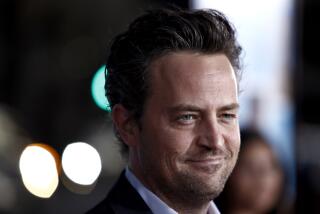Conrad Murray’s words may seal his fate
- Share via
The prosecution’s case against Michael Jackson’s personal physician might be summarized this way: He lied about everything, but even if he told the truth, he’s still guilty.
During a four-week case that rounded toward a conclusion Friday, prosecutors suggested that Dr. Conrad Murray’s own words created a Catch-22 in which conviction was the only outcome possible. His statement to police, if taken by jurors at face value, contained enough admissions of gross negligence to amount to a manslaughter confession, prosecutors said.
And if jurors decided he lied to police, as numerous scientific experts and others said he must have, his true conduct was even more egregiously criminal, they argued.
FULL COVERAGE: The trial of Conrad Murray
The simultaneous use and debunking of Murray’s own words sets up an enormous challenge for his defense, which will began its case next week.
His lawyers have not announced whether the doctor will take the stand in his own defense. But some legal experts said that would be a significant risk.
“There is just so much out there now, from his statement and these experts, and for him to get up there, I just think the prosecution would have a field day,” said J. Christopher Smith, a Los Angeles criminal defense attorney who has followed the case closely.
Initially, Murray’s attorneys planned to delve into Jackson’s history of abusing propofol and other drugs and the financial pressures on him at the time he died. These two elements, the defense had said, explained why the singer might give himself the anesthetic propofol in a desperate attempt to sleep before critical rehearsals.
But Superior Court Judge Michael Pastor barred most testimony pertaining to those areas as irrelevant and prejudicial.
So the defense case instead will focus on witnesses who are expected to challenge the prosecution’s contention that Murray’s treatment of Jackson amounted to criminal conduct. They will also present character witnesses likely to offer testimonials about the doctor’s charitable works and caring manner.
Legal experts said the prosecution’s case has left the defense with a big damage-control job.
“They’ve got the defense in a trick bag,” Smith said. “Whichever way they go, it seems like the prosecution is going to have a comeback.”
The falsehoods and ineptitude, as recounted from the witness stand, began months before Jackson’s death when Murray assured an insurance company the singer was in perfect health. It culminated in his interview with homicide detectives. An audio recording of that 2 1/2-hour interview was played for jurors and became an initial basis for three prosecution medical experts to call Murray clearly responsible for his patient’s death.
“It’s like leaving a baby that’s sleeping on your kitchen countertop,” one expert, cardiologist Alon Steinberg, said of Murray’s account to police that he left Jackson alone after injecting him with propofol.
Steinberg and two other physician experts found medical incompetence in nearly every part of Murray’s narrative. He failed at even the most basic aspects of care, they said. His attempt to perform CPR when Jackson still had a pulse goes against basic medical training, the experts said.
The witnesses also attacked Murray’s account of how Jackson died. Dr. Steven Shafer, an anesthesiologist, said that almost nothing about the quantity of drugs Murray said he administered matched up with what was later found in Jackson’s blood. Of the physician’s claim that he gave Jackson just two small injections of the sedative lorazepam, Shafer said, “This did not happen.”
He was also dismissive of Murray’s account of injecting Jackson with a 25-milligram dose of propofol more than an hour before his death. Shafer said blood levels showed the dose was probably 40 times larger and given by an intravenous drip. The only way to explain the massive amount of propofol in Jackson’s body, Shafer said, was that Murray left the drug running into Jackson’s veins after his heart stopped.
He also called “crazy” the defense’s main contention: that Jackson injected himself with a lethal combination of lorazepam and propofol. Even when Shafer appeared to throw the defense a bone — acknowledging Friday that it was possible Jackson had triggered the fatal flow of propofol by knocking a clamp off an intravenous line — he maintained Murray was at fault for abandoning his patient.
Defense attorneys have already abandoned one scenario they had previously argued: that the pop star drank the propofol that killed him, prompting a prosecutor to complain that their case was “ever-changing.”
The Murray defense team plans to call two experts: a toxicologist and Dr. Paul White, an anesthesiologist who has researched propofol. Those experts could argue that Murray’s care of Jackson was unorthodox but not criminal. The charge of involuntary manslaughter requires prosecutors to show that Murray caused Jackson’s death by committing a crime “not amounting to a felony” or while acting “without due caution and circumspection.”
Defense experts could tell jurors that off-label uses of drugs are common and in many cases help patients, said Joseph Low IV, a Long Beach criminal lawyer who previously worked on Murray’s defense.
“Just because he used propofol differently than its original use doesn’t make it … manslaughter,” Low said.
He said that defense experts might tell jurors that the hard-and-fast rules prosecution witnesses have accused him of violating — providing propofol in a household setting, for example — are more nuanced.
“Standard of care is a matter of opinion based on who you put on the stand,” Low said.
The character witnesses include an 82-year-old woman who knows Murray’s work at a Houston charity clinic. The defense is expected to use their testimony to counter the portrayal of Murray as primarily concerned with collecting his $150,000-a-month salary.
“It humanizes him,” said veteran criminal defense attorney Roger Rosen. “Jurors are still human beings at the end of the day, and I think that even though they are instructed not to be guided by sympathy, let’s face it: That does enter into it.”
FULL COVERAGE: The trial of Conrad Murray
More to Read
The biggest entertainment stories
Get our big stories about Hollywood, film, television, music, arts, culture and more right in your inbox as soon as they publish.
You may occasionally receive promotional content from the Los Angeles Times.












